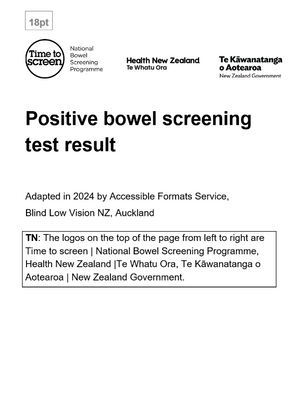Positive bowel screening test result - English Large Print - HE2728

Brief information in English Large Print for people who have received a positive bowel screening test result. The most common further investigation is a test called a colonoscopy, that checks the bowel.
The full resource:
Positive bowel screening test result
What happens next?
Positive bowel screening test result - what happens now?
Your bowel screening test result is positive, which means some blood was found in your bowel motion (poo). You might be feeling a bit concerned or worried. This is understandable, but it’s important to know that a positive result does not necessarily mean you have bowel cancer. Small amounts of blood in your bowel motion (poo) are often caused by bowel polyps (growths), or other minor conditions such as haemorrhoids (piles). These can be easily treated.
What happens next?
You will need a further investigation to find out what is causing the bleeding. The most common test to check your bowel is a colonoscopy.
Someone from your local bowel screening programme will contact you and organise a date for your colonoscopy. You’ll be able to ask them questions about the colonoscopy. You can also talk to your doctor.
What is a colonoscopy?
During a colonoscopy, a specially trained doctor or nurse looks directly at the lining of your large bowel (colon), using a very small camera. The camera is on the end of a thin flexible tube, which is put into your bowel through your anus (bottom). The camera is used to look at the lining of your bowel to see if there are any problems.
A colonoscopy can find out whether there are polyps or cancers in the bowel. Polyps are not cancers but may develop into a cancer over a number of years. If found, polyps will generally be removed to help prevent cancer. The removed polyps are sent to a laboratory to check for any cancer cells.
About seven in 10 people who have a colonoscopy as part of the National Bowel Screening Programme will have polyps. About seven in 100 people who have a colonoscopy as part of the programme will be found to have cancer. At least a third of the cancers detected are early stage.
Will it hurt?
Some people find a colonoscopy a little uncomfortable. Before the colonoscopy, you will be given medication that makes you sleepy and helps make the colonoscopy more comfortable. There will be a doctor and nurses in the room to care for you.
How do I prepare for the colonoscopy?
Before you have your colonoscopy, your bowel needs to be emptied so the bowel lining can be clearly seen. You may be asked to stop eating some foods in the days before your colonoscopy. You will need to have a special bowel cleansing drink, which will make you go to the toilet and clear your bowel. Instructions come with your appointment letter.
How long will I need to stay in hospital?
The colonoscopy usually takes less than an hour, but you will need to be at the hospital for a few hours.
A nurse or doctor will talk with you before your colonoscopy and answer any questions you may have. You will be asked to sign a consent form. Family members and support people are welcome to be with you before you have your colonoscopy.
It’s important to take the rest of the day off following the colonoscopy. It’s not safe to drive or work if you have the medication that makes you sleepy.
Are there any risks from a colonoscopy?
A colonoscopy is usually a safe procedure. However, as with most medical procedures, problems can sometimes happen. There is a small risk that the colonoscopy itself or the removal of polyps will cause bleeding or damage to your bowel. If this happens, you may need further treatment.
Do I need to pay for the colonoscopy, other tests or treatment?
The colonoscopy and any follow-up tests or treatments organised within the public health system are free if you are eligible.
What if I cannot keep my appointment?
Please call us as soon as possible if you can't come for your colonoscopy. Use the phone number on your appointment letter. We will make another appointment for you.
What if I have bowel cancer?
If you have bowel cancer you will be referred to a specialist. The main treatment for bowel cancer is usually surgery. You may also need chemotherapy or radiotherapy.
How successfully can bowel cancer be treated?
People who are diagnosed with bowel cancer at an early stage have a much greater chance of being successfully treated. If the cancer is detected at a later, more advanced stage, it is harder to treat.
For more information
- Go to timetobowelscreen.nz
- Free phone 0800 924 432, Monday to Friday 8am-6pm
- If you are Deaf, hard of hearing, deafblind, speech impaired or find it hard to talk, you can use New Zealand Relay Services (nzrelay.co.nz)
- Email info@bowelscreening.health.nz
For information on eligibility for publicly funded health services see Eligibility for publicly funded health services – Health New Zealand | Te Whatu Ora or call 0800 924 432
Other languages and formats
This pamphlet is also available in alternate formats and in the following languages:
Te Reo Māori, Cook Islands, Samoan, Fijian, Rotuman, Kiribati, Tongan, Tuvaluan, Niuean, Tokelauan, Simplified Chinese, Traditional Chinese, Korean, Hindi, Punjabi, Tagalog, Arabic and Burmese.